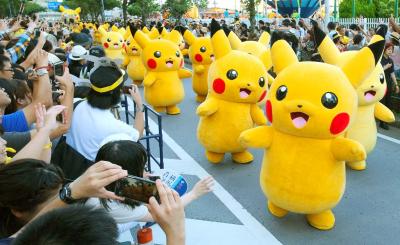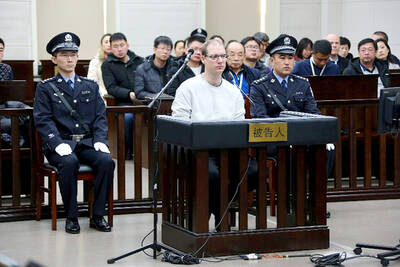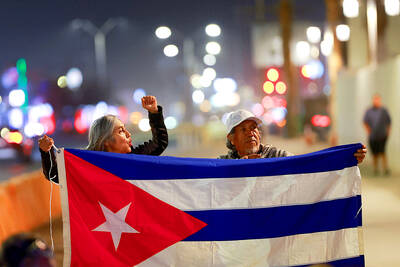Lithuanians started voting yesterday in parliamentary elections, with an impeached president and a Russian-born pickle magnate poised for a stunning political comeback.
The vote also features a referendum on whether to keep a flawed, Soviet nuclear plant operating beyond its scheduled closure.
If victorious, Rolandas Paksas’ Order and Justice and Viktor Uspaskich’s Labor Party could form the backbone of a new, populist coalition that would likely talk tough to Brussels and cozy up to neighboring Russia.
The governing Social Democrats, who have held the post of prime minister since 2001, are down in the polls and will struggle to pass the 5 percent barrier needed to make it into the Baltic state’s 141-member Seimas, or parliament.
A victory for the populists — who have promised to raise public sector salaries and halve the number of lawmakers — would be a tremendous blow for President Valdas Adamkus, who has fought bitterly with both Paksas and Uskaskich and has appealed to voters not to vote on an emotional impulse.
“I ask you to stand firm against short-term political dismay, anger and a feeling of revenge,” Adamkus said on Saturday.
Paksas was impeached in 2004 for violating the Constitution and abuse of office, making him the first European head of state to be impeached and removed from office. Though he is constitutionally barred from occupying public office, he could wield tremendous influence on the sidelines. His party already controls the mayor’s office in Vilnius, Lithuania’s capital.
Uspaskich, who made his fortune in Lithuania selling jarred pickles, was forced to resign from the economy minister’s post after coming under investigation for a conflict of interest case involving Russia, where he was born.
Hounded by prosecutors, Uspaskich fled to Russia in May 2006, but eventually returned to Lithuania, where he was placed under house arrest. He is still under investigation, and although the house arrest has been lifted, he is barred from leaving Lithuania for six years.
In the meantime, Lithuania’s 2.6 million registered voters will be asked whether the Baltic state should postpone closing a Chernobyl-style nuclear plant in Ignalina slated for shutdown in December next year.
The plant’s design flaws scare EU members, who insist that it be closed, while Lithuanians claim that shutting down the unit, which gives them energy independence, will leave them subject to the whims of Russia, an unreliable energy supplier.

China’s military news agency yesterday warned that Japanese militarism is infiltrating society through series such as Pokemon and Detective Conan, after recent controversies involving events at sensitive sites. In recent days, anime conventions throughout China have reportedly banned participants from dressing as characters from Pokemon or Detective Conan and prohibited sales of related products. China Military Online yesterday posted an article titled “Their schemes — beware the infiltration of Japanese militarism in culture and sports.” The article referenced recent controversies around the popular anime series Pokemon, Detective Conan and My Hero Academia, saying that “the evil influence of Japanese militarism lives on in

DIPLOMATIC THAW: The Canadian prime minister’s China visit and improved Beijing-Ottawa ties raised lawyer Zhang Dongshuo’s hopes for a positive outcome in the retrial China has overturned the death sentence of Canadian Robert Schellenberg, a Canadian official said on Friday, in a possible sign of a diplomatic thaw as Canadian Prime Minister Mark Carney seeks to boost trade ties with Beijing. Schellenberg’s lawyer, Zhang Dongshuo (張東碩), yesterday confirmed China’s Supreme People’s Court struck down the sentence. Schellenberg was detained on drug charges in 2014 before China-Canada ties nosedived following the 2018 arrest in Vancouver of Huawei chief financial officer Meng Wanzhou (孟晚舟). That arrest infuriated Beijing, which detained two Canadians — Michael Spavor and Michael Kovrig — on espionage charges that Ottawa condemned as retaliatory. In January

A sign hanging from a rusty ice-green shipping container installed by Thai forces on what they say is the border with Cambodia reads: “Cambodian citizens are strictly prohibited from entering this area.” On opposite sides of the makeshift barricade, fronted by coils of barbed wire, Cambodians lamented their lost homes and livelihoods as Thailand’s military showed off its gains. Thai forces took control of several patches of disputed land along the border during fighting last year, which could amount to several square kilometers in total. Cambodian Kim Ren said her house in Chouk Chey used to stand on what is now the Thai

NEW RULES: There would be fewer school days, four-day workweeks, and a reduction in transportation services as the country battles a crisis exacerbated by US pressure The Cuban government on Friday announced emergency measures to address a crippling energy crisis worsened by US sanctions, including the adoption of a four-day work week for state-owned companies and fuel sale restrictions. Cuban Deputy Prime Minister Oscar Perez-Oliva Fraga blamed Washington for the crisis, telling Cuban television the government would “implement a series of decisions, first and foremost to guarantee the vitality of our country and essential services, without giving up on development.” “Fuel will be used to protect essential services for the population and indispensable economic activities,” he said. Among the new measures are the reduction of the working week in